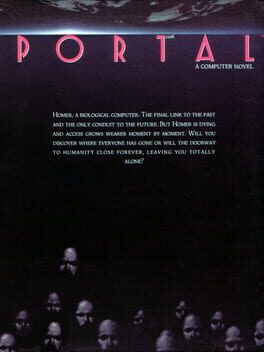

Portal was an ambitious attempt to tell a story with the depth of a novel and the interactivity of a game, sitting somewhere between interactive fiction and simulation of a computer system.
Released on
Genres
Reviews View More
Portal (no, not that one) is an early visual novel written for a number of early personal computer platforms, including the Atari ST, MS-DOS, Apple II and Mac, and the platform I played it on, Commodore Amiga. The premise of the game reminds me of Her Story, where your character's role is barely defined, instead the player more or less is the player character as you solve a mystery by interacting with a computer terminal. In this case, the game takes place in the early 22nd century, and the framing device is that you are an astronaut returned to Earth after 100 years, only to find the planet completely deserted. You come in contact with the various subsystems of "Worldnet", the global computer system that monitored humanity. Worldnet is broken up into twelve categories, with the gameplay requiring you to periodically check each of these systems to see if new logs have appeared, which adds to the story. These categories range from History, Scitech, Psitech (as in psychic), Geography, and more, with the most notable of them being "Homer", a storytelling AI which is your main point of contact, constructing the narrative of what happened to humanity. The writing feels very much like a classic sci-fi novel, and presents a speculative future examining privacy, utopias, world surveillance, and ESP and psychic abilities, because it's a 1980s sci-fi, so of course it does. I was surprised at the level of detail in the writing, and how the various subsystems were incorporated into the world building. Without getting too into it, it's revealed that humanity all vanished in an event known as the "Migration", instigated by one Peter Devore, a young man who somewhat unintentionally was given access to classified psychic research. He uses this knowledge to come into psychic contact with a woman named Wanda, who is in cryogenic sleep on her way to the star Vega. Peter and his followers build upon these principles, often opposing the establishment who fears what may become of their experiments. It's an interesting and unique narrative, if sometimes a bit poorly paced. The biggest issue with the game (aside from actually getting it to run these days) is the UX. You're not notified when some new log is added, so you have to one by one check each of the twelve subsystems to see if anything is new so that you can progress (although four of the subsystems is just flavor and don't need to be checked). It seems the authors agreed with the clunkiness of actually playing the game, as the story was adapted into a traditional novel later, although I haven't read it. It's an interesting story in the end, one written with different sensibilities and focal points than you find these days. It's difficult to say whether you'd lose anything by just reading the novel. Most of the game is just text or monochrome images (the Amiga version does have color, but it's not well utilized. The Mac port doesn't even have color at all), and combined with the tedium of actually getting access to the next entry, I'm not sure it adds much. However, I can see how this would be quite impactful when released in 1986, and I think there are some people who have very fond memories of this title to this day.
